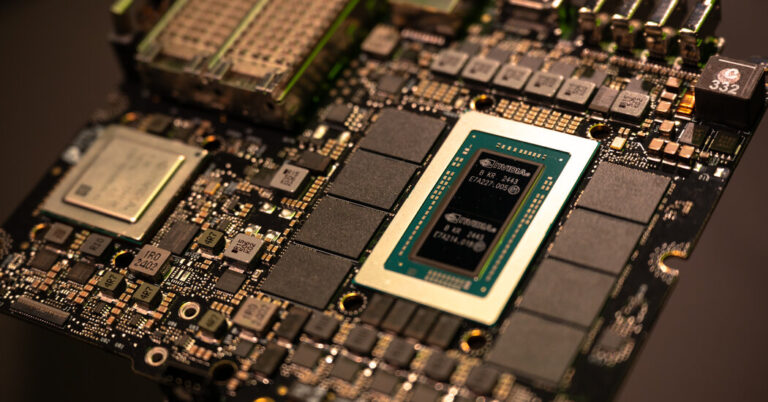Nvidia said on Tuesday that the U.S. government had blocked the sale of some of its artificial intelligence chips to China without a license and would begin requiring a license for future sales.
The restrictions are the first major limits that President Trump’s administration has put on semiconductor sales abroad. It raises the possibility that Nvidia’s sales to China will evaporate in the coming months, bringing an end to a business that has contracted as the United States has curbed chip exports to its geopolitical rival.
Nvidia has fought hard to maintain sales to China in the face of rising U.S. government restrictions. In 2022, the Biden administration imposed rules to curb the export of Nvidia’s best A.I. chips to China. Nvidia responded by modifying one of its leading A.I. chips, the H100, so that its abilities fell below U.S. government thresholds. The resulting H20 chip became a China-specific product.
Nvidia will take a $5.5 billion charge against its revenue in the current quarter because of H20 inventory, purchase commitments and related reserves, which it won’t be able to sell or fulfill in the wake of the government’s new rule, the company said.
The write-down is a bigger strategic blow than a financial one. Nvidia, which dominates the market for semiconductors used in building artificial intelligence systems, considered selling chips to China vital to its future. If it withdrew from the market, it feared that it would surrender sales to China’s leading A.I. chipmaker, Huawei, and that Huawei would begin to challenge it for sales around the world.
“This kills Nvidia’s access to a key market, and they will lose traction in the country,” said Patrick Moorhead, a tech analyst with Moor Insights & Strategy. “Chinese companies are just going to switch to Huawei.”
Nvidia declined to comment. The company’s share price dropped more than 5 percent in after-hours trading on Tuesday.
A spokesman for the Commerce Department, Benno Kass, said on Tuesday that the administration was issuing new export licensing requirements for the Nvidia H20; a chip from Advanced Micro Devices, the MI308; and their equivalents.
“The Commerce Department is committed to acting on the president’s directive to safeguard our national and economic security,” Mr. Kass said.
Nvidia revealed the change in a regulatory filing on Tuesday, a day after the company won the White House’s praise for promising to invest $500 billion in A.I. infrastructure in the United States. The company had said it would begin making servers at a factory in Houston and work with chip packaging companies based in Arizona.
But those promises were made after the Trump administration had notified Nvidia privately on Wednesday that it would begin requiring a license to sell any to A.I. chips to China, Nvidia said in its regulatory filing. The company said on Tuesday that the Trump administration had followed up with that notice to say the licensing requirements will “be in effect for the indefinite future.”
The change also comes weeks after Jensen Huang, Nvidia’s chief executive, met with Mr. Trump at a Mar-a-Lago dinner that cost $1 million a person. In the wake of that meeting, there were reports that the U.S. government would back off its plan to restrict Nvidia’s sales to China.
In a letter sent to Commerce Secretary Howard Lutnick on Monday, Senator Elizabeth Warren, Democrat of Massachusetts, urged the Trump administration to act quickly to restrict the H20, saying Chinese tech giants like Tencent, Alibaba and ByteDance were scrambling to stockpile the chips. Those sales were happening even as U.S. start-ups and small businesses in the United States were unable to acquire as many chips as they wanted, she said.
“The Commerce Department cannot further delay undertaking necessary and urgent action on the H20 to protect U.S. national security,” she wrote.
Since Mr. Trump took office, his administration has been promising to crack down on U.S. support of Chinese A.I. companies. The Chinese start-up DeepSeek rattled Washington in recent months when it released a new A.I. system that it said had been created for a small fraction of the cost that U.S. companies had been spending to train artificial intelligence.
During his nomination hearing, Mr. Lutnick said the United States should stop letting Chinese companies use American technology, including Nvidia’s, “to compete with us.”
Last year, Nvidia reported $17 billion in sales to China. The company’s business there has contracted as a total percentage of its revenue in the face of U.S. government restrictions. Sales to China, which were about a fifth of Nvidia’s revenue in the 2023 fiscal year, declined to 13 percent last year.
In its filing, Nvidia did not say whether the licensing requirements would affect future sales. Because it creates the H20 chip by throttling the performance of its H100 chips, it has only a limited inventory, analysts say. It can sell the H100 chips that haven’t been manipulated to U.S. and European companies.
Ana Swanson contributed reporting from Washington.


